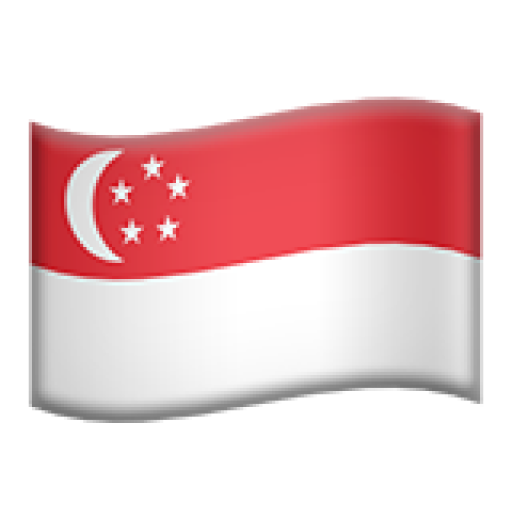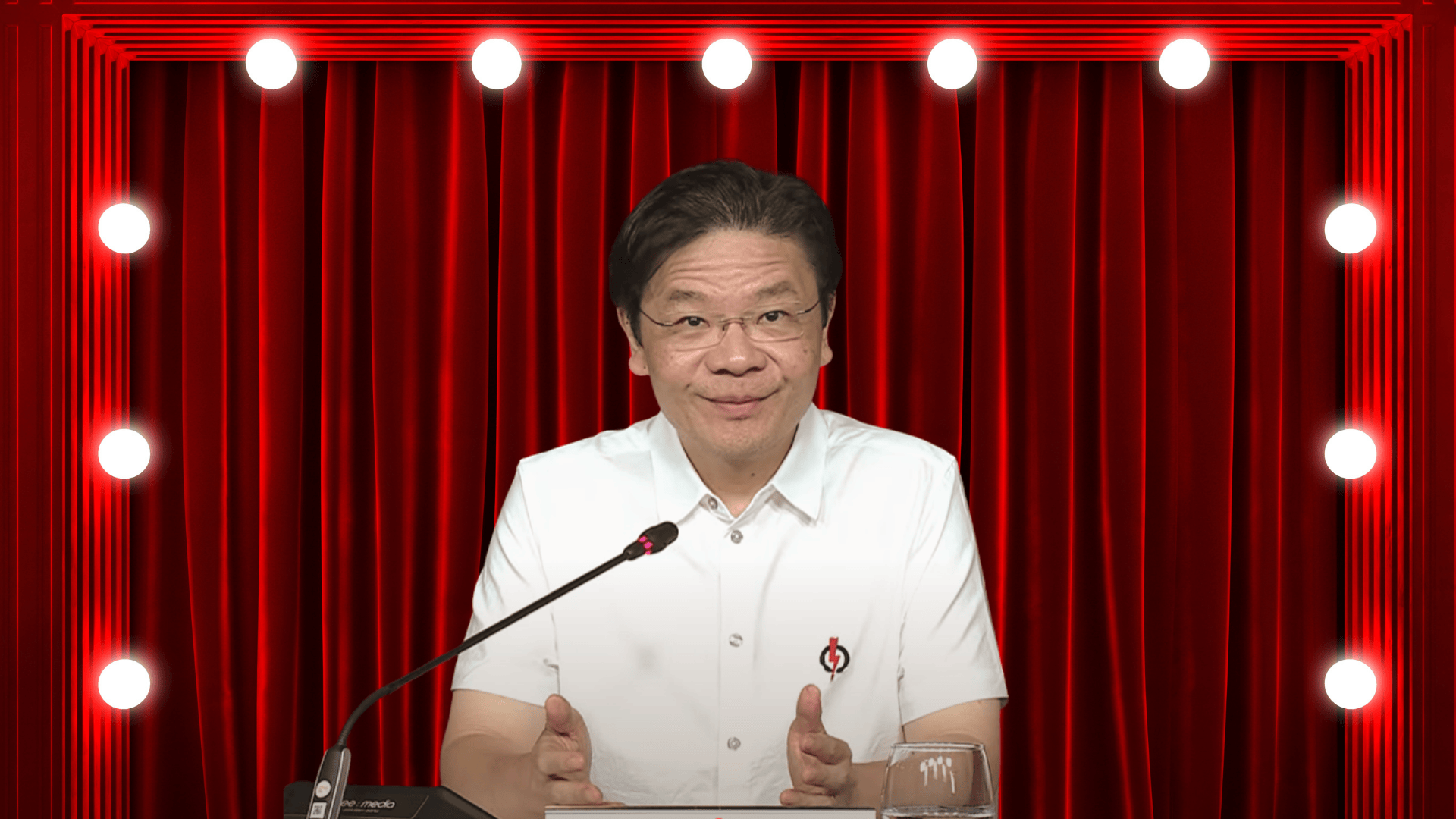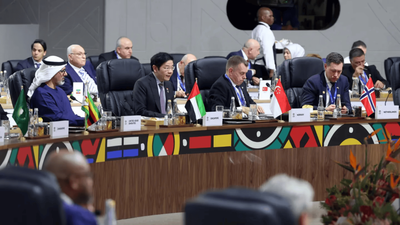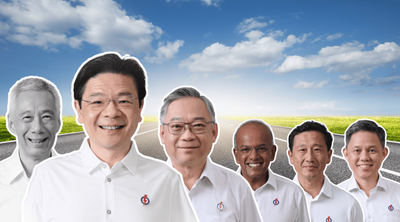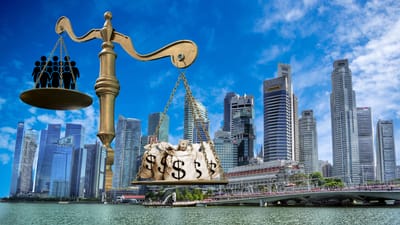In the early 2000s, when civil servant Lawrence Wong got promoted into the elite Administrative service, he probably surprised some. In 2011, when Admin service officer Wong got picked by the PAP as a candidate, he probably surprised some. In 2016, when full-minister Wong was touted as a potential next prime minister—alongside five other Chinese men—he probably surprised some.
A series of inexplicable local and global events then conspired to elevate Wong to the top job. Heng Swee Keat, the original pick to lead the fourth-generation (4G) of the ruling People’s Action Party (PAP), stumbled into an “East Coast Plan”. Chan Chun Sing, the supposed favoured pick of many in the 3G, stuttered through a litany of public gaffes. And then in 2020, a virus streaked across the world to devastating effect, giving Wong a platform that, with the benefit of hindsight, appears like it was the perfect audition.
Yet even set against all that, last week’s general election (GE) results would have stunned Wong’s most starry-eyed fan, perhaps the entire nation. Consider these facts. The last time Lee Hsien Loong recorded such a high vote share, walkovers aside, was 1988. For K Shanmugam, 2001. For Vivian Balakrishnan, this year’s his peak. For the PAP as a whole, if one excludes the bizarre circumstances behind the SG50 2015 election, this was its biggest win since 2006.
Perhaps the most astounding statistic is this: Lawrence Wong, the first party leader not to be unanimously picked by his peers, is also Lawrence Wong, the first prime minister to outperform his predecessor in the GE. The PAP lost vote share when Goh Chok Tong took over from Lee Kuan Yew, and again when Lee Hsien Loong took over from Goh. But Wong at GE2025 scored over four percentage points more than Lee at GE2020—itself another supposed “flight to safety” (pandemic) election. In Jom’s voter sentiment survey conducted last June, respondents ranked Lee and Wong, respectively, as Singapore’s two most popular politicians. By now, they may have swapped places.
Some local and international media have called it a “landslide”. Academic Cherian George disagreed, calling it a “status quo vote”, both for the PAP and the Workers’ Party (WP), at an AcademiaSG webinar on Sunday with Ian Chong, Donald Low and Kenneth Paul Tan, among others. Wong called it a “clear and strong mandate”. Sceptics will say the results are less about him than other factors, from global instability to opposition duds. Sure, almost every vote is multi-factorial, but it’d be naive, and perhaps petty, to not acknowledge Wong’s immense popularity. We’re in the age of the guitar hero.
What’s next for the PAP? Over the past decade, there’ve been many signs that the party is more fractured than it’s ever been (though still incredibly cohesive). The Oxley Road saga and the controversial circumstances behind Halimah Yacob’s “election” as president in 2017 are just two incidents believed to have divided devotees. Separately, insiders suggest that Chan and Ong Ye Kung, the two other prior contenders for the job, have far more established party bases than Wong.
In the face of that, Wong’s resounding victory should cement his position internally, and widen his latitude to pursue both his Forward Singapore agenda and the leadership renewal that began seriously on Nomination Day. Of the PAP’s 87 elected MPs, 24 are new. The civil servants Wong has headhunted are, by all accounts, just like him: wonkish, hardworking, personable team players, and yes—many from humble beginnings.
Wong’s leadership could prompt even more civil service crossovers. While perhaps preferable to the cavalcade of military men in white, it brings its own set of problems, from potential groupthink amongst scholars—who’ve been together since they were kids and know only one larger employer—to even further conflation of the civil service and the PAP.
Hopefully Wong’s strong mandate extinguishes any suggestion or possibility that the Lee family might linger near the levers of power. For the first time in its history, Singapore is contemplating a political future without the Lees. On a related note, Wong’s performance augurs well for the much-needed shift away from elitism. He is the first leader in Singapore’s history not to have come from a brand-name school.
The reason Wong’s ascent through the ranks has surprised those around him is partly because of his unassuming nature, something I noticed when we first met in 2004 in graduate school. We’ve bumped into each other a few times since, and my favourite anecdote is from a Sunday late afternoon party several years ago. There were a few Americans who worked broadly in international affairs. Not all of them recognised Wong, who was then minister for national development. I overheard one asking: “So what do you do?” Wong responded: “I work in government.” This person eventually realised that he was speaking with one of the most politically powerful people in Singapore.
But how might Wong’s own personality and temperament evolve as he spends more time with people from, ahem, not-so-lousy schools? Opposition parliamentarians have told me that he’s not averse to lampooning them along with the PAP’s old guard. One can’t help but wonder if and when Wong feels pressured to push an agenda or assume a persona not instinctively his.
Consider the fearmongering through the last weeks of the campaign, and especially on the party broadcasts, the night Singaporeans were teleported back to an era when candidates sat in spartan studios and beamed messages through TV. “A storm is coming,” Wong warned, as he grimaced uncomfortably. He curiously compared today’s geopolitics to that of 1965, when Singapore was booted out of Malaysia, and 1968, when the British forces decided to leave: “Who forms your government now is an existential question.”
Following that awkward first half, regular programming resumed. The guitar-hero eased up with his expressions of hope, including a Singapore where every citizen is “empowered to pursue their dreams and become the best versions of themselves.” With this strong mandate, which Wong will we witness? It’s one of the many fascinating sidebars with the new Parliament.
With policymaking, the vote indicates that Singaporeans broadly agree with the PAP’s approach, particularly when it comes to issues like cost of living and inequality—or at least, that’s how Wong will probably interpret the result. So we can expect tweaks—for instance with minimal unemployment protection and what academic Donald Low calls the VCR (Voucher, Cash, Rebate) approach—but no fundamental shifts. The WP has also been the least radical of the opposition parties in terms of its policy alternatives—a half step to the left?—and so the fact that it’s the only remaining one (more below) will also narrow the range of ideological views in Parliament, tempering any pressure for more aggressive policy shifts from Wong.
The question on many analysts’ minds is whether Wong’s mandate will inspire socio-political liberalisation by the PAP, in the belief that its position is unassailable—or a persistence with autocratic methods, perhaps feeling vindicated by their outcomes. “The temptation of power is a great one,” said academic Ian Chong. “There’ll be a lot of temptation to come down in ways that are hard on civil society and also on the opposition parties.”
The party’s recent electoral history offers no clues. After it lost vote share in 2011 and 2020, it certainly cracked down—the removal of Han Fook Kwang as editor of The Straits Times one sign from the former period, and the relentless haranguing of “liar” Pritam Singh one from the latter. But the PAP also indulged its autocracy after its thumping victory in 2015, the apparent “Tan Cheng Block” element of the Halimah presidency the signature example.
Unless there is immense public pressure, it seems unlikely that Wong will liberalise political structures and electoral competition too much, for instance by making the People’s Association or the Electoral Boundaries Review Committee more independent; or asking the latter to release its report a year before Polling Day, as some want; or reforming the GRC system, which has, Low said, “created and institutionalised barriers to greater political participation and political competition.”
The system benefits the incumbent, and Wong might jeopardise his own internal standing if he pursues this, especially amongst less secure 4G leaders. Most importantly, there is another well-oiled party machinery in town that, whatever its objections (Marine Parade or otherwise), seems to have adapted quite well to the current game. If the WP can play, why change?
By contrast, many PAP fans, even as they desire a dominant presence in Parliament, dislike the muffling of alternative views and voices in society. And so it’s possible that we will see some civil society and media liberalisation under Wong. The best indication of this from the GE is POFMA. A month ago, Jom and other independent media outlets were bracing ourselves for an onslaught, just like what happened at GE2020. In the end, not a single POFMA was issued.
Yes, Jom criticised IMDA for wrongfully preventing us from “boosting” our content on Meta’s platforms, by absurdly labelling the content itself as “election advertising”, of the sort that political parties engage in. We still believe IMDA’s action was wrong, and it caused us to lose potential new subscribers (and hence revenue) during a critical news period for journalistic publications like ours. But we appreciate the pleasant interaction with IMDA on the point—not long ago we wouldn’t even have gotten a response. And we’re aware that the usual firepower of old—threats, lawsuits, POFMAs—didn’t materialise. (Maybe it should have. The smearing of Alia Mattar’s position on Palestine by a pro-PAP group was arguably the worst falsehood perpetuated in this GE.)
The emotional trajectory of opposition supporters from Saturday to Sunday evenings was fascinating. Cries of “bloodbath” morphed into some variant of “Oh, WP actually not bad ah.” Like at GE2020, the WP outperformed the PAP in one important regard: overall, it won marginally more votes in the districts it contested. Its Sengkang GRC team improved on its past result. Its Aljunied GRC team, despite the relentless onslaught against Pritam Singh, saw only the tiniest dip in votes.
And it’s clear that amidst a national swing towards the PAP, the WP increased the distance between itself and other opposition parties, none of whom will feature in the next Parliament. Inklings of a two-party system? But with just 10 elected MPs and two non-constituency MPs (NCMPs)—versus the PAP’s 87—the sky is still very much white. Perhaps the main disappointment will be that its Punggol GRC team, featuring an impressive slate led by Harpreet Singh, senior counsel, was soundly beaten by the parachuting Gan Kim Yong and his team. (tl;dr the “task force man” elak the “Harpoon”.)
In its post-mortem, the WP must interrogate if Pritam Singh was too conservative. For years, some WP fans have been calling for a more expansionist strategy. That might involve its more popular leaders, such as Singh or Sylvia Lim, leaving the relatively safe shores of Aljunied GRC to contest in riskier, if possibly winnable, turf nearby.
Singh’s usual rebuttal, repeated again last month, is to point to the narrow margin of victory at GE2015. Never mind that it was an odd year filled with general PAP bonhomie, and much has changed since. Was Singh so worried that the “liar” smears had resonated with his voters? Perhaps he doesn’t realise how popular he is. (Joint third, incidentally, with Ong Ye Kung in our same survey.)
Imagine some plausible scenarios: Singh following Faisal Manap to contest in Tampines GRC, or even leading the Punggol GRC team, while asking Harpreet Singh to take his place in Aljunied GRC. Sure, hindsight is everything, but based on results and sentiments, that strategy might have delivered to the WP both an additional GRC, and its “star catch” in Parliament.
With fresh evidence from this GE, it’s unlikely that Pritam Singh will raise the spectre of “2015” again. Assuming the WP continues on its “responsible and loyal opposition” trajectory, WP fans and Singaporean voters should reasonably look forward to a tantalising prospect at the next GE: a Pritam Singh-led team outside Aljunied GRC. By then, it will probably have two additional heavyweights. Just like it’s done before—for instance with Leon Perera—the WP will use its two NCMP slots to familiarise Singaporean voters with the likes of Eileen Chong, Andre Low and Michael Thng. Fervent online speculation about whom Singh might pick is proof not only of the party’s relevance, but also of the average voters’ growing democratic interest.
Moreover, the worst thing the establishment muck machine could gather was “fuck” in a private Telegram chat. This suggests that the party’s candidate scrutiny has improved—no more Raeesahgates, supporters will hope. (What Andre Low should have done, a friend said, was to simply follow the tried-and-tested Vivian Balakrishnan school of crisis comms: It wasn’t me. I don’t know who put the fucks in there. I’ve complained to Tele. No updates. Let’s move on.)
Perhaps the greatest compliment to the WP came, unintentionally, from none other than Lee Hsien Loong: “Judge them, not just as individuals, but also as the party they stand for.” This, George said, “was an implicit acknowledgement that as individuals, they’re pretty good.” And, from last week’s vote, it seems Singaporeans judge them pretty well as a party too.
What about the other parties? Walid Abdullah, NTU professor, argued on Jom’s election night show that if the Progress Singapore Party (PSP) were to lose in the West Coast-Jurong West GRC, it might spell the end of the party. Notwithstanding the blatant gerrymandering, it certainly shocked the party, which came within a whisker of winning the old West Coast GRC the last time, that it achieved just under 40 percent of the vote. For founder and team lead Tan Cheng Bock, who used to regularly record some of the PAP’s highest vote shares when he was their backbencher, it was a galling way to bow out.
For the Singapore Democratic Party (SDP), Chee Soon Juan performed admirably despite being forced to move to Sembawang SMC from the erstwhile Bukit Batok SMC less than two months ago. There were moments on Saturday night, before the WP’s contests were called, when it appeared like Chee might have been in line for an NCMP seat. The PAP would have breathed a sigh of relief that their bête noire of the past three decades will still not face them in Parliament.
More shocking was that Paul Tambyah, well-liked across the political spectrum, managed to attain only 38 percent of the vote, down from over 46 percent the last time, against the PAP’s Liang Eng Hwa in Bukit Panjang SMC. As the only repeat contest from GE2020, was this the best barometer of the nationwide swing towards the ruling party? The most persuasive alternative explanation is simply that Liang has doggedly worked the ground for years, with the sort of financial and grassroots backing Tambyah can only dream of. It’s a similar rationale to how Tin Pei Ling managed to capture the hearts of so many in MacPherson SMC at GE2020, where she was one of the party’s highest scorers.
Both the PSP and SDP are facing existential crises. The smaller parties, meanwhile, performed poorly, if not abysmally. Red Dot United, best of the rest, couldn’t cross 30 percent across all four of its constituencies. By contrast, the two independent candidates impressed, particularly Jeremy Tan, who got 36 percent against PAP newcomer Gho Sze Kee in Mountbatten SMC. His rally speech garnered more than 120,000 views on YouTube, and wowed netizens with its substance and verve.
Could we be in for an era in which individuals, focused on local politics, and unencumbered by party politics and stances, supplant smaller parties (at least in SMCs)? It’s one that might enliven kopitiam talk, but perhaps won’t bother PAP and WP strategists too much in the near term, given the evidence that smaller parties don’t really split the vote like they used to. Put another way, multi-cornered fights appear to affect the WP less and less.
This speaks to the increasing discernment of the Singaporean voter, another highlight of GE2025. Some have argued that PAP voters decided based on fear, though that’s both reductive and belittling. That the WP bucked the overall swing is one refutation of this. George said that voters are no longer in protest mode, but are making positive choices.
Two notable events, one just before and one after, have offered conclusive evidence that the Wong administration is sensitive to public pressure. After his big song and dance about leaving his nominated MP position to enter party politics, Joshua Raj Thomas was ultimately not fielded, almost certainly because of the blowback. Ng Chee Meng, meanwhile, seems to be actively campaigning to replace Josephine Teo as one of Singapore’s most disliked politicians. His narrow victory in Jalan Kayu SMC over the WP’s Low seems like the only highlight amidst scandal after scandal: his role in the NTUC-Allianz saga; him allegedly disrespecting teachers in 2017 when he was minister for education, including telling one, “When minister is talking to you, you better stand up”; and his connections to Su Haijin, one of the “Fujian gang” involved in Singapore’s biggest-ever money laundering case. (It was another fabulous GE season for Singapore’s talented meme makers, including yeolo.sg, and for them, Ng Chee Meng was the kayu that kept on giving.)
On Monday, a petition titled “Stop Ng Chee Meng from Joining Singapore Cabinet” was launched and by Tuesday, Ng had issued a statement saying that he’d asked Wong not to assign him any position in government. Siew Kum Hong, former NMP, said, “It’s always better to decline first, before you get declined.”
Hence this GE is when many Singaporeans discovered not just the power of their vote, but that of their voice. Academic Kenneth Paul Tan expressed optimism largely because of the evolving “language that we have for understanding our condition”. Noting “more energy flowing between and within civil society”, he said that young people are “evolving different vocabularies and different kinds of frameworks for making sense of this”.
So, with under two-thirds of the popular vote, the PAP has won almost 90 percent of the elected seats in Parliament. Disgruntlement with the skewed outcomes that are the product of structural factors favouring the incumbent will rightfully continue. But, given that many WP fans (not all) are moderately pleased with their party’s overall performance, there is also an uplifting way for every citizen to interpret last week’s results. Which is that somewhere between 65 percent and 80 percent of Singaporeans came away smiling.
In a world where many societies are politically fractured, and where discourse across party lines, if it even exists, has become so toxic, it is another thing Singaporeans should be proud of. Notwithstanding the numerous issues with our fledgling democracy, which we must keep collectively working through, that should inspire hope, not fear.
Sudhir Vadaketh is Jom’s editor-in-chief. Additional contributions by Abhishek Mehrotra. Letters in response to this piece can be sent to sudhir@jom.media. All will be considered for publication on our “Letters to the editor” page.
This is our final GE2025 piece of content. We’re only about halfway to breaking even, and need all the help we can get. Help ensure that Jom is around for the next GE.
Not yet a paying member? Please become one today, starting at just S$10/month.
Already a paying member? Please consider upgrading to Supporter (S$25/month) or Patron (S$950/year) today. Log in, click on Account in the top right, then “Change plan”.
In the below video we explain exactly where your money goes, and why we need it.

